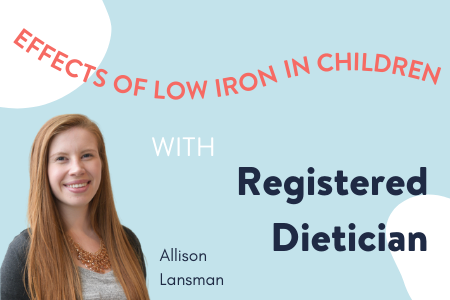Poor Iron Levels Could be Making Your Child Moody

Have you been struggling with a moody child or teen at home?
From birth to the age of 18, children experience great amounts of growth. This includes not only physical change but also growth of the brain, which requires a combination of highly complex internal and external processes to successfully develop cognitive functions.
Occasional moodiness is actually not uncommon while the brain is still maturing and learning to manage emotional responses to life’s daily stresses. However, when cognitive development is disrupted, more severe alterations in mood can occur. This can result in not only a lack of emotional control and uneven temperament, but can also result in poor cognitive performance in childhood and even adulthood.
Undernutrition is directly linked to limited cognitive development (in children under 5) and limited cognitive function (in all ages). In other words, inadequate macro and micro nutrients your body absorbs from the foods you eat could be causing irritability, fussiness, and general moodiness.
Iron is a primary micronutrient needed for regulation of brain growth and functioning. From supplying oxygen to helping convert fatty acids into energy for the brain, regulating nerve cell formation, and even playing a part in mood hormone synthesis, iron is crucial for cognitive function.
However, the WHO reported that global iron deficiency and anemia affects 47.4% of preschool aged children and 25.4% of school-aged adolescents around the globe. These chronically low iron levels have the ability to negatively alter brain development and emotional response, perhaps even long-term.
So, if your child or teen has been experiencing difficulties such as low energy levels, impaired memory and/or learning, or uneven temperament and moodiness, you may want to rule out whether iron is a cause.
This article will assist you in understanding the process of cognitive development from birth to 18 years, cognition’s connection to mood and behavior, and the role iron plays in brain development and emotional response during adolescence. Scroll down to see how to address your child’s iron levels and moodiness today.
Cognitive Development During Childhood
Cognitive development is the growth of a child’s ability to think and reason.
As normal cognitive function progresses, the brain grows both internally and externally – retaining skills of intelligence, language, and memory.
The process of cognitive development evolves from birth through adolescence and is divided into four stages:
- Sensorimotor Stage (from birth to age 2)
This is the earliest stage of cognitive development. Infants and toddlers acquire knowledge through sensory experiences and handling objects (i.e., toys).
- Preoperational Stage (from age 2 to age 7)
This stage is when children begin to harness language, verbal skills, and learning through pretend play, but logic is still a struggle.
- Concrete Operational Stage (age 7 to age 11)
The third cognitive stage happens when children begin to understand their thoughts are unique to them and are not necessarily shared by everyone around them.
- Formal Operational Stage (age 12 to 18)
The final developmental stage is hallmarked by the ability to understand abstract ideas, deductively reason between multiple solutions to problems, and think more scientifically.
During this 4-stage developmental process, children and teens are also growing their behavioral capacity. This includes learning to manage one’s emotional responses and regulate moods toward stressful situations they encounter in day-to-day life.
However, disruptions in brain and cognitive growth have the potential to impair cognition and emotional regulation. And depending on the disruption, effects on brain function can impact be either short or long lasting.
What can Disrupt Normal Cognitive Development?
The normal cycle of cognitive development is not fully complete until the brain is fully developed, which typically occurs at the age of 25.
During this process, internal chemical and genetic disruptions and external changes in environment can arise, and therefore, cognitive functions such as thinking, learning, as well as emotional response can be negatively affected.
The most common factors found to alter normal cognitive development between birth to age 18 include:
- Stress
During childhood, the brain will adapt to chronic levels of emotional stress and neglect, including changes in brain chemistry and structure. These modifications on a developing brain can result in difficulties learning and managing behavior.
- Lack of sleep
During sleep, the brain recharges and repairs from any stress and damages that may occur during the day.
From birth to 18-years-old, the recommended hours of sleep per night is anywhere from 8 to 14 hours per day. However, the older your child gets, the less likely they are to be sleeping enough. Research has shown, 73% of teenagers don’t get their recommended amount of sleep, which can result in impaired attention, poor memory and decision-making, and lack of emotional control.
- Digestive infections
Infections of the digestive tract during the first 6 to 18 months of life can cause an alteration (i.e., dysbiosis) of the intestinal microbiota. This causes damage to the intestinal barrier and stimulates chronic, systemic inflammation, leading to alterations in the gut-brain-axis.
Consequently, cognitive development and function is impaired and results in poor memory and reasoning.
- Malnutrition and micronutrient deficiencies
The negative effect of malnutrition and micronutrient deficiencies – vitamins and minerals – on cognitive development during formative years has been long supported by research.
When the diet is missing key nutrients – such as iron – necessary for brain development and function during adolescence it can lead to alterations in brain chemistry and cognitive and mood dysfunction.
Could Poor Iron Levels be Making Your Child Moody?
As an essential micronutrient, iron plays many important roles in the body. This includes assisting in development of the brain, cognitive functioning, and regulation of mood and behavior.
During the process of brain development, and maintaining brain function throughout life, iron is involved with different enzyme systems in the brain that:
- Regulate normal brain growth
- Develop nervous system cells in the brain (i.e., neurons)
- Mood hormone synthesis and brain receptor construction (i.e., dopamine and GABA)
- Generate fatty acids for energy production
- Deliver oxygen to the brain
When your child’s iron levels are low, the amount of oxygen delivered throughout the body is limited, thus the brain struggles with developing fully. It also struggles with functioning at its highest capacity.
As a result, beyond tell-tale physical and pathological clues – pale skin, shortness of breath, and/or frequent infections and illness – some behavioral signs that may indicate your child having low iron levels are:
- Unusual fatigue and moodiness
- Pica or craving for non-nutritive substances (i.e., ice, dirt, etc.)
- Poor appetite or extremely picky eating
Reasons Your Child May have Low Iron
There are several reasons your child’s iron levels could be low. Some frequent causes of low iron in the body include:
- A low-iron diet or poor iron absorption
A diet low in iron-dense food is the leading cause of iron deficiency. Since your body cannot produce iron, your diet is the only way to get your daily iron needs.
However, you could also be eating enough iron, but experiencing poor iron absorption. This occurs in the gut and can occur due to lacking in complementary vitamins that improve iron absorption in the diet or absorption issues caused by conditions, like gastrointestinal disorders or chronic kidney disease, that affect nutrient absorption.
- Drinking too much milk
Children who drink excessive amounts of milk – over 24 ounces per day – are at high risk of low iron levels.
Whether cow’s milk, goat’s milk, or a milk alternative, these dairy or non-dairy drinks can be very filling but contain minimal amounts of iron. As a result, children are unable to meet their daily iron needs.
- Low intake of complementary micronutrients for cognitive function
Iron is one of many micronutrients needed to maintain cognitive function. Many vitamins and minerals work together to support the brain, such as zinc, copper, and selenium.
When deficient in any of these nutrients, the brain is unable to function fully and your child will struggle with learning, attention, and behavior regulation.
Address Your Child’s Mood and Iron Levels Today
Determining the cause of your child or teen’s moodiness should be your first step.
Begin by seeking care from your child’s pediatrician or physician. They will provide an official examination to verify if your child’s emotional struggles are caused by low iron levels and prescribe an individualized treatment plan.
Next, focus on age-appropriate diet changes to increase the amount of iron your child is consuming, including:
- Eat a Healthy, Iron-Rich Diet
A healthy, age-appropriate diet packed with iron-rich foods is the best approach for improving your child’s iron and mood.
Cut back on highly processed and refined foods and replace them with lean meats and seafood or plant-based iron sources (i.e., beans and leafy green vegetables) to help boost your child’s blood irons by meeting daily iron recommendations for their age:
- 7-12 months: 11mg
- 1-3 years: 7mg
- 4-8 years: 10mg
- 9-13 years: 8mg
- 14-18 years: 15mg (girls), 11mg (boys)
- Eat nutrient-dense foods for cognitive development
Foods dense in nutrients like iron, zinc, copper, etc. that you should add to your child’s diet are:
- Lean proteins (red meats, chicken, lamb, and eggs)
- Seafood and shellfish
- Nuts and seeds (especially Brazil nuts)
- Legumes
- Mushrooms
- Potatoes (both sweet and white)
- Fortified grains and cereals
- Supplement your diet with additional iron sources
In addition to increasing the variety of foods in your child or teen’s diet, you can also fortify their favourite drinks and meals with extra iron by adopting cooking tools like Lucky Iron Fish that are proven to improve iron levels.
Overall, the most effective way to improve your child’s brain growth is to ensure their iron levels are adequate with a better diet. Make simple switches to offer a better, age-appropriate diet every day, packed with high-iron and complementary foods for better cognitive function and mood.
About the Author:




